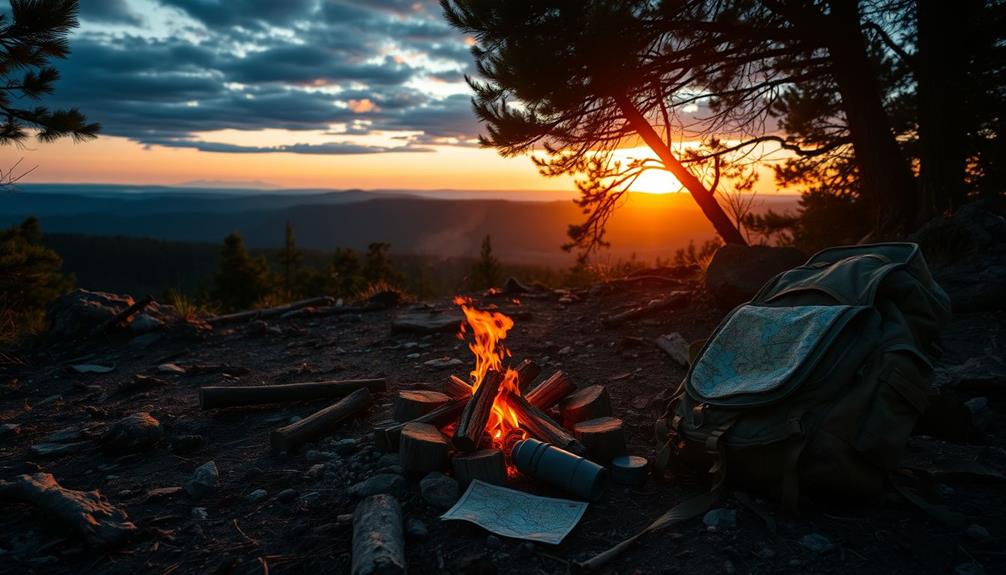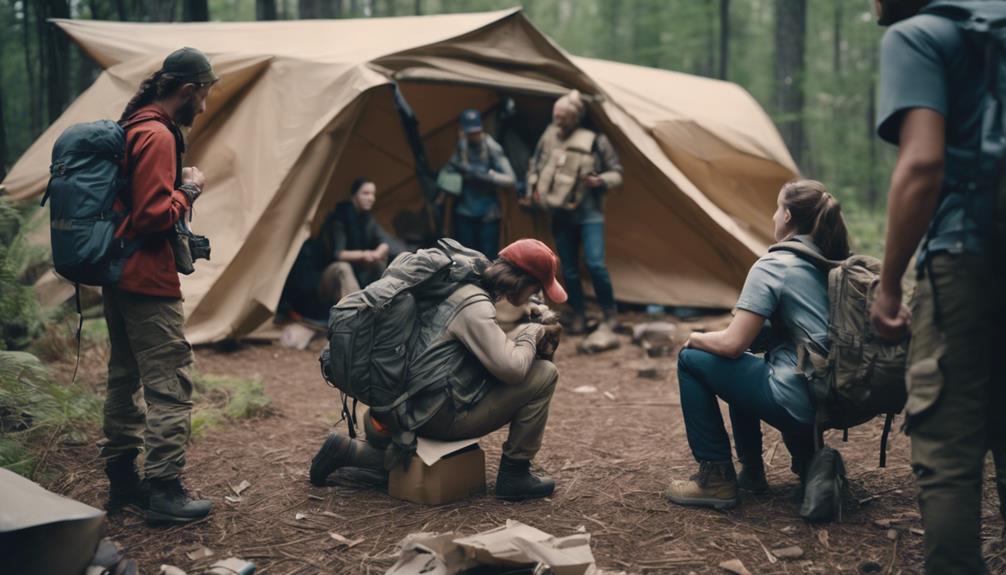For every prepper, must-see survival movies offer vital lessons in resilience and resourcefulness. Films like *I Am Legend* and *28 Days Later* showcase psychological strength and adaptability during crises. *Cast Away* teaches you about decision-making in isolation, while *Zombieland* combines humor with essential teamwork skills. Don't forget *The Road*, which emphasizes human connection amidst chaos. Watching these films can inspire your preparedness journey and help cultivate emotional resilience. Ready to discover even more impactful survival narratives that sharpen your skills and mindset? There's a lot more waiting for you!
Key Takeaways
- I Am Legend showcases psychological strength and the importance of preparedness in a post-apocalyptic world.
- 28 Days Later emphasizes resilience and adaptability in crisis situations, making it essential viewing for preppers.
- The Road explores human connection and moral dilemmas, highlighting the emotional struggles faced in survival scenarios.
- Cast Away exemplifies resourcefulness and decision-making skills necessary for thriving in isolation.
- Zombieland combines humor with teamwork and survival tactics, illustrating the importance of collaboration in dire situations.
Essential Characteristics of Survival Films

Survival films often center around gripping scenarios that test human resilience and ingenuity. These narratives highlight essential traits like resourcefulness and teamwork, pushing characters to adapt quickly to unpredictable threats.
You'll notice that preparedness is a recurring theme, with characters often relying on their skills and knowledge to navigate extreme challenges. Emotional struggles and moral dilemmas frequently emerge, showcasing the psychological toll of survival amidst chaos.
As you watch these films, you'll see how vital mental fortitude becomes, as characters face despair and fear. Ultimately, these stories illustrate the importance of human connection, as relationships forged in adversity can provide strength and hope when survival seems uncertain.
Each film serves as a reminder of what it takes to endure and overcome.
Top Survival Movies for Preppers

When it comes to prepping, watching the right movies can provide valuable insights into survival strategies and the human spirit's resilience. Films like I Am Legend and 28 Days Later showcase how psychological strength and preparedness can make all the difference in a crisis.
The Road explores emotional struggles, highlighting the importance of human connection when society crumbles. You'll also find wisdom in Cast Away, where isolation tests resourcefulness and decision-making.
For a mix of humor and survival tactics, Zombieland entertains while emphasizing teamwork. Each of these films not only captivates but also teaches crucial lessons about adaptability, trust, and the moral dilemmas that arise when survival is on the line.
Realistic Pandemic Responses in Film

Realistic pandemic responses in film often highlight the urgency and chaos that accompany health crises. Movies like Contagion and Outbreak depict how quickly a virus can spread, forcing society to react. You'll see the importance of having a solid medical plan and the emotional toll on those involved.
| Film | Key Response | Lessons Learned |
|---|---|---|
| Contagion | Rapid public health response | Importance of preparedness |
| Outbreak | Quarantine and containment | Need for effective communication |
| 28 Days Later | Adaptation to new realities | Resilience in the face of chaos |
These films remind you that a strong, coordinated effort is essential when dealing with a pandemic, showcasing the significance of teamwork and clear messaging.
Trust and Communication in Crises

Trust and communication play a pivotal role during crises, shaping how communities respond and adapt to unfolding events.
In survival situations, clear and honest communication can prevent chaos and foster cooperation. When you trust the information being shared, you're more likely to act decisively and effectively.
Movies like Contagion illustrate how misinformation can spiral into panic, emphasizing the need for reliable sources.
Building trust within your community gives everyone a sense of security, enabling collective preparedness.
Remember, transparency is key; when people feel informed, they're more likely to stay calm and take appropriate actions.
Emotional Resilience in Post-Apocalypse

Steering through the emotional turmoil of a post-apocalyptic world can be overwhelming, but building emotional resilience is essential for survival.
To navigate this chaos, you need to focus on key strategies:
- Cultivate connections: Forming bonds with others can provide support and motivation.
- Practice mindfulness: Staying present can help manage anxiety and fear.
- Embrace adaptability: Being flexible in your approach can ease the pressure of uncertainty.
- Reflect on purpose: Keeping a sense of purpose can drive you to push through tough times.
Zombie Survival Strategies in Cinema

In a world overrun by the undead, emotional resilience is just one piece of the puzzle; you also need practical survival strategies to navigate the chaos.
Films like 28 Days Later and Zombieland showcase essential tactics. First, always stay mobile and avoid overcrowded areas; isolation often means safety.
Teamwork is vital—form alliances to increase your chances of survival. Utilize improvised weapons and tools, as shown in various cinematic battles.
Knowledge of your environment can provide escape routes and resources. Keep a low profile to avoid attracting attention, and remember to stock up on essentials like food and medical supplies.
Importance of Resourcefulness

Resourcefulness is an essential trait that can make the difference between survival and defeat in extreme situations. In the face of adversity, your ability to think creatively and adapt to challenges is vital.
Survival movies often highlight this skill, demonstrating how characters use their surroundings to their advantage. Here are some key aspects of resourcefulness:
- Improvisation: Finding alternative solutions when supplies are limited.
- Adaptability: Adjusting strategies based on changing circumstances.
- Critical Thinking: Analyzing situations to make quick, effective decisions.
- Collaboration: Leveraging the skills of others to enhance survival chances.
Ethical Dilemmas in Survival Situations

Survival situations often force you to confront tough ethical dilemmas that challenge your values and morals. You might find yourself questioning whether to prioritize your own survival over others' lives or to steal food to keep your group alive. It can be difficult to know what the right decision is in these situations, but it is important to weigh the consequences and consider the potential long-term effects of your choices. In some cases, making savvy beef jerky choices, such as rationing and sharing, may be necessary to ensure the survival of the group as a whole while still upholding your moral compass. It’s essential to navigate these ethical dilemmas with careful consideration and empathy for all those involved.
Choices like these can lead to intense internal conflict, forcing you to weigh the consequences of your actions. Films like The Road and I Am Legend highlight these moral gray areas, showcasing how characters grapple with decisions that test their humanity.
The struggle between self-preservation and altruism is central to many survival narratives, prompting you to reflect on what you truly value when survival is at stake. Ultimately, these dilemmas shape character development and resonate with audiences on a profound level.
Community Preparedness Strategies

When it comes to facing crises, communities that prioritize preparedness often fare better than those that don't.
To build a resilient community, focus on these key strategies:
- Establish clear communication channels to share crucial information during emergencies.
- Create a network of trusted local resources, like shelters and emergency services, for quick access.
- Conduct regular training sessions to equip members with essential survival skills and knowledge.
- Foster a culture of collaboration by organizing community drills and preparedness events.
Innovation and Ingenuity in Survival

Building a resilient community sets the stage for innovation and ingenuity in survival situations. When faced with challenges, you'll find that creative problem-solving can mean the difference between life and death.
Films like I Am Legend and Zombieland showcase characters who adapt quickly, using available resources to overcome obstacles. These stories highlight the importance of thinking outside the box—whether it's repurposing materials or developing new techniques for survival.
You'll see how teamwork amplifies individual creativity, allowing groups to devise innovative solutions together. Embracing technology and experimenting with new ideas can lead to breakthroughs in dire circumstances.
Ultimately, these films inspire you to cultivate a mindset of innovation, ensuring you're prepared for whatever the future holds.
Frequently Asked Questions
What Are the Best Survival Skills to Learn From These Movies?
You can learn essential survival skills from these movies, such as resourcefulness, teamwork, adaptability, and mental fortitude. They highlight the importance of planning, effective communication, and moral decision-making during challenging situations. Embrace these lessons!
How Can I Develop Mental Fortitude for Real-Life Emergencies?
In the storm's eye, you find clarity. Build mental fortitude by facing challenges head-on, embracing discomfort, and nurturing resilience. Each obstacle strengthens your spirit, transforming fears into stepping stones for growth in real-life emergencies.
Are There Any Survival Podcasts or Books to Complement These Films?
You should explore podcasts like "Survival Podcast" and books like "The SAS Survival Handbook." They'll provide practical insights and strategies that complement what you learn from the films, enhancing your survival skills and knowledge.
What Common Prepper Mistakes Should I Avoid When Watching These Movies?
When watching survival movies, avoid thinking they're just entertainment. Don't overlook practical skills, teamwork's importance, or emotional resilience. Remember, real-life situations require preparation, adaptability, and quick thinking, not just what you see on screen.
How Can I Start Building a Personal Survival Kit Today?
You can start building a personal survival kit today, balancing urgency with careful planning. Gather essentials like water, food, and tools while considering your unique needs. Don't wait; preparedness is crucial when emergencies strike.
Conclusion
In summary, survival films not only entertain but also challenge you to think critically about your own preparedness. For instance, imagine a community facing a sudden viral outbreak. As panic spreads, neighbors band together, sharing resources and skills, while grappling with the ethical dilemma of prioritizing their own families over others. These films teach you that resilience, trust, and innovative thinking are essential in dire situations. So, as you watch, reflect on how you'd respond when the unexpected strikes.










